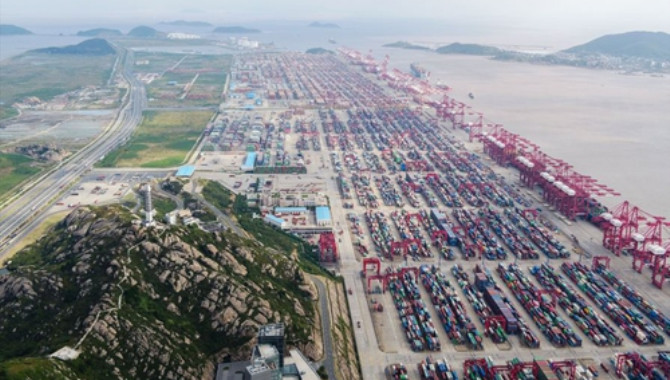
International shipping businesses remain optimistic about the industry's future development in China despite facing some temporary difficulties due to the impact of the COVID-19 pandemic. Experts noted that shipping centers in the future should emphasize green technologies such as blockchain to improve their shipping efficiency in the post-pandemic era.
"China is one of our most important markets. We continue to see significant growth potential as the country's economy transforms, and the region's composition of trade changes toward higher value-added patterns," Caroline Wu, Managing Director of Maersk China, told the Global Times on Tuesday.
In the first quarter of 2020, the demand for shipping containers declined by 5 percent globally, according to Xinhua News Agency. However, Danish shipping giant Maersk's earnings before interest, tax, depreciation and amortization (EBITDA) improved 23 percent to $1.5 billion year-on-year.
As global demand continues to be affected due to the pandemic, "we expect volumes in the second quarter to decrease across all business sectors," Wu said, noting that the company continues to support their customers in keeping their supply chains running. Besides traditional ocean solutions, Maersk's offerings include barge, cross border trucking, intercontinental rail, air freight and warehousing, Wu said.
DNV GL, the Norwegian shipping certification agency, continued its business in China, feeling little impact from the COVID-19 pandemic, as many of its contracts were signed before major lockdowns began, Gao Wei, Business Development and Technical Support Manager from Global Business Development, DNV GL, told the Global Times on Monday, noting that they have lowered their expectations for the rest of the year as the demand for worldwide shipping falls.
However, Gao is still "optimistic for future development," despite the industry facing some temporary difficulties.
Zhuang Wei, BIMCO's regional manager in Asia, similarly echoed Gao's optimism. Zhuang noted that marine economy has played a growing role in China's GDP, while Shanghai has become a major shipping hub that is leading nationwide development. In fact, China's maritime economy has doubled its size compared with a decade ago, according to a report issued by the Ministry of Natural Resources in May.
International shipping companies care deeply about "cost control, policy continuity, economic predictability, and transparency" when conducting business in China, Zhuang told the Global Times on Monday.
Wu, from Maersk China, agreed that China has made significant improvements in business environment over recent years. "The efforts to promote free trade zones and ports are an excellent initiative," Wu said, noting that these measures will only lead to positive impacts on trade and economic growth, and the shipping and logistics industry will only benefit from such initiatives.
But Zhuang still admits that Shanghai's rising operation costs in regard to labor and housing pose a major challenge for companies looking to expand operations in the city.
Building a green hub
Many Chinese cities, including Shanghai, Chongqing, Wuhan, Tianjin, Dalian, and Xiamen are currently developing world-class shipping centers, while Shanghai is a representative of the country's competitiveness with centers from around the world, Zhang Jieshu, Deputy Party Secretary of Shanghai International Shipping Institute, told the Global Times on Monday.
Specifically, the Port of Shanghai saw 43.3 million twenty-foot equivalent container units pass through in 2019, which is up 3 percent year-on-year, ranking first in the world for 10 consecutive years, according to Shanghai authorities. Maersk is the largest foreign carrier user of the port, according to Wu.
The establishment of shipping centers is important to boost the regional economy, Zhang said, adding that many international shipping centers from around the world are also major financial hubs, which are helpful to improve logistics efficiency and lower logistics costs.
The industry has suffered huge losses caused by the pandemic, Zhang admits, but there may still be some opportunities. In fact, it could be an opportunity for local governments to issue preferential conditions to international shipping organizations, Zhang noted, and such centers should focus on green development and information technology such as blockchain to improve shipping efficiency in the post-pandemic era.
Source:Global Times
The opinions expressed herein are the author's and not necessarily those of The Xinde Marine News.
Please Contact Us at:
media@xindemarine.com


 Ningbo Containerized Freight Index Weekly Commentar
Ningbo Containerized Freight Index Weekly Commentar  Ningbo Containerized Freight Index Weekly Commentar
Ningbo Containerized Freight Index Weekly Commentar  Ningbo Containerized Freight Index Weekly Commentar
Ningbo Containerized Freight Index Weekly Commentar  BIMCO Shipping Number of the Week: Bulker newbuildi
BIMCO Shipping Number of the Week: Bulker newbuildi  Ningbo Containerized Freight Index Weekly Commentar
Ningbo Containerized Freight Index Weekly Commentar  Ningbo Containerized Freight Index Weekly Commentar
Ningbo Containerized Freight Index Weekly Commentar